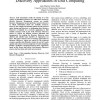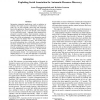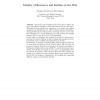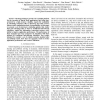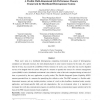134
Voted
JCP
2008
15 years 2 months ago
2008
Grid technologies enable the sharing of a wide variety of distributed resources. To utilize these resources, effective Resource Management systems are needed. Resource Management s...
159
click to vote
CORR
2007
Springer
15 years 2 months ago
2007
Springer
Information integration applications, such as mediators or mashups, that require access to information resources currently rely on users manually discovering and integrating them ...
100
click to vote
IJSWIS
2008
15 years 2 months ago
2008
One of the main strengths of the web is that it allows any party of its global community to share information with any other party. This goal has been achieved by making use of a u...
129
click to vote
GRID
2006
Springer
15 years 2 months ago
2006
Springer
Desktop Grids have proved to be a suitable platform for the execution of Bag-of-Tasks applications but, being characterized by a high resource volatility, require the availability ...
103
Voted
ENTCS
2006
15 years 2 months ago
2006
We deal with temporal aspects of distributed systems, introducing and studying a new model called timed distributed -calculus. This model extends distributed -calculus with timers...
128
click to vote
ENTCS
2006
15 years 2 months ago
2006
Accounting for the CPU consumption of applications is crucial for software development to detect and remove performance bottlenecks (profiling) and to evaluate the performance of ...
88
Voted
CORR
2006
Springer
15 years 2 months ago
2006
Springer
The present work falls in the line of activities promoted by the European Languguage Resource Association (ELRA) Production Committee (PCom) and raises issues in methods, procedur...
117
click to vote
CLUSTER
2006
IEEE
2006
IEEE
A flexible multi-dimensional QoS performance measure framework for distributed heterogeneous systems
15 years 2 months ago
When users' tasks in a distributed heterogeneous computing environment (e.g., cluster of heterogeneous computers) are allocated resources, the total demand placed on some sys...
119
click to vote
GRID
2008
Springer
15 years 2 months ago
2008
Springer
Traditional resource management techniques (resource allocation, admission control and scheduling) have been found to be inadequate for many shared Grid and distributed systems th...
133
click to vote
FGCS
2008
15 years 2 months ago
2008
This paper deals with the performance optimization of multiple-task applications in GRID environments. Typically such applications are launched by a Resource Manager, which only t...
